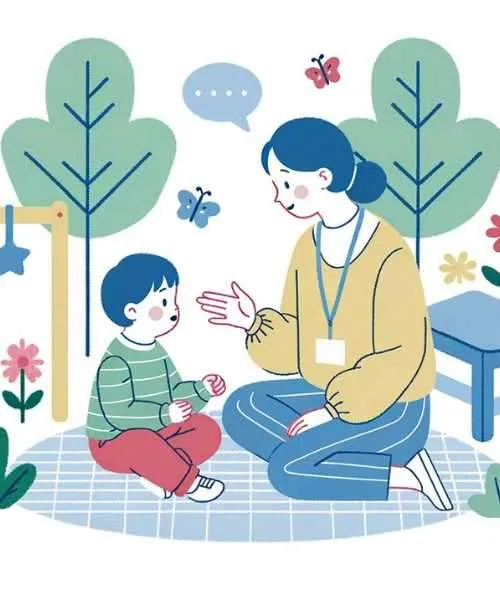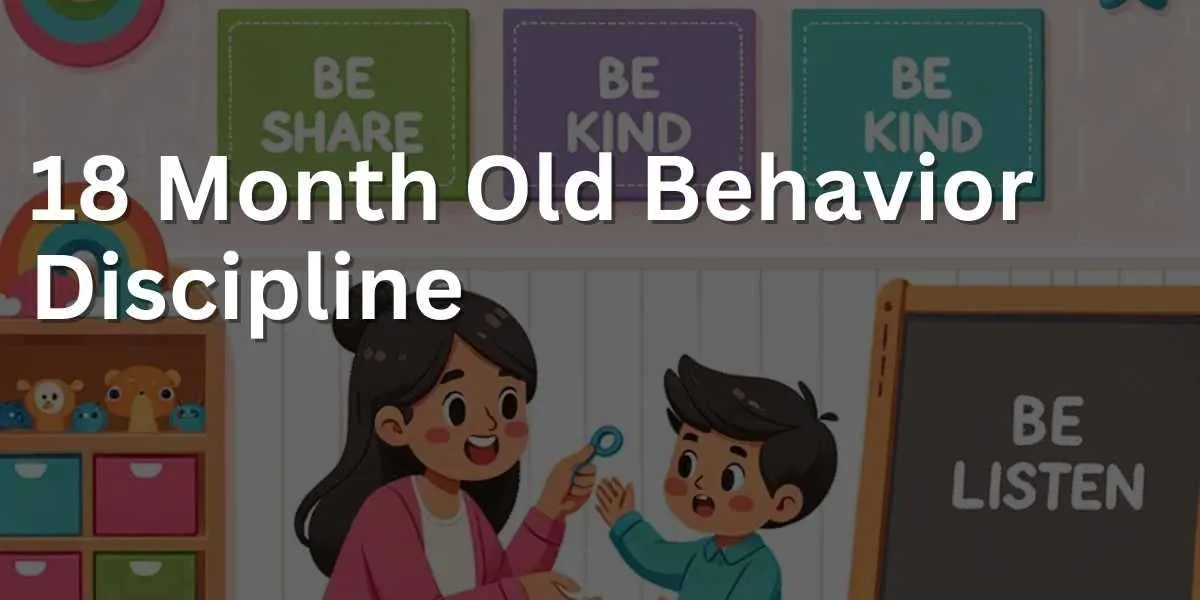18-month-old behavior discipline navigates the unique crossroads of toddlerhood. As your little one embarks on the journey of self-expression, it often comes with challenges that leave parents perplexed and at wit’s end.
If you’ve been grappling with tantrums, boundary-testing, or just the sheer unpredictability of this age, you’re far from alone.
Drawing from expertise in early childhood development and behavioral strategies, I’ve crafted insights that resonate with this dynamic age.
Dive into this guide with me, and let’s foster understanding, patience, and effective techniques to guide your toddler through these pivotal months.
Key Takeaways on Discipline for 18 month old
Effective discipline is about teaching and guiding your child’s behavior, not punishment.
Understanding your 18-month-old’s behavior and setting clear rules and limits can prevent unwanted behavior.
Effective discipline strategies include positive reinforcement, redirection, and time-outs, and teaching social skills can help prevent specific challenges.

Understanding Your 18-Month-Old’s Behavior
At 18 months old, toddlers are full of energy and curiosity. They are exploring their world and learning about their surroundings. It’s important to understand their behavior and emotions to effectively discipline them.
At this age, toddlers are developing their independence and testing boundaries. They may become frustrated when they can’t do something or get what they want. It’s important to set age-appropriate expectations and boundaries to avoid tantrums and misbehavior.
Toddlers at this age are still learning to express their emotions and feelings. They may become overwhelmed by their emotions and have difficulty controlling them. It’s important to acknowledge their feelings and help them develop coping strategies.
Each toddler has their own unique personality and temperament. Some may be more outgoing and adventurous while others may be more reserved and cautious. It’s important to consider their personality when disciplining them. It’s also important to focus on positive reinforcement and praise for good behavior.

Methods For 18 month old Discipline
Disciplining an 18-month-old child involves setting rules and limits that will help them know what is expected of them. This will help the child to understand what behaviors are acceptable and what is not. Setting rules and limits can be challenging, but it is an essential part of teaching your child how to behave appropriately.
Consistency is vital when it comes to setting rules and limits for your child. It is essential to ensure that both parents are on the same page when it comes to disciplining the child.
Consistency helps the child to understand that there are consequences for their actions, and it also helps to reduce confusion. When parents are consistent, the child is more likely to understand what is expected of them and what behaviors are acceptable.
It is crucial to define acceptable behavior for your child. This means that you need to set clear boundaries for your child and let them know what behaviors are acceptable and what is not.
You can do this by using positive reinforcement to reward good behavior and redirecting negative behavior. For example, if your child hits another child, you can redirect their behavior by telling them that hitting is not acceptable and showing them how to use their words to express themselves.
Here are our top toddler 18 month old discipline techniques:

Give Your 18 Month Old Momentary Breaks (Time-out)
Timeouts are an effective way to discipline an 18-month-old child. Timeouts involve removing the child from the situation and placing them in a designated area for a short period, usually one minute per year of age.
This gives the child time to calm down, reflect on their behavior, and learn from their mistakes. It is essential to be consistent when implementing timeouts so that the child understands that there are consequences for their actions.
I’s important to remember that for toddlers of this young age, the primary objective is not punishment but rather to help them switch gears or calm down, and always ensure you have the best toys for 18 months old.
Give Your 18 Month Old Engagement Periods (Time-in)
A newer discipline strategy, ‘time-ins,’ involves staying with the toddler during their moment of upset. Instead of sending them away to manage their feelings, you are there to model good behavior, provide comfort, and help them navigate their emotions.
It’s a method that teaches toddlers about empathy and how to manage their own things and feelings.
Teach Your 18 Month Old Consequence of Actions (Take away a toy or privilege)
Parents have a responsibility to teach their child how to behave appropriately. This involves setting rules and limits, defining acceptable behavior, and implementing natural consequences for negative behavior. It is important to remember that discipline should be used as a tool to teach the child, not to punish them.
When parents are consistent and use positive reinforcement, they can help their child to develop good behavior habits that will last a lifetime.
This technique is about showing your child the consequence of their bad behavior. If they throw a toy in anger, for instance, you can take it away for a certain period. Make sure to explain why you’re doing it so the child can link the action to the consequence.

Teach Your 18 Month Old Incentive Method (Rewards)
Another effective strategy is to use positive reinforcement. This involves praising your child when they exhibit good behavior. For example, if your child shares a toy with another child, you can praise them for their kindness and generosity.
Positive reinforcement can help to reinforce good behavior and encourage your child to continue exhibiting it.
Rewards serve as positive reinforcement, encouraging children to repeat good behaviors. For instance, you might promise a bedtime story if your toddler gets ready for bed without fussing. The added benefit of this method is that it promotes positive attention, which can be a powerful motivator for young kids.
Diversion Tactic (Distraction)
One of the most effective strategies for disciplining an 18-month-old is to distract and redirect their attention to something else. For example, if your child is throwing a tantrum because they can’t have a toy, you can distract them by offering them another toy or an activity that they enjoy.
This will help to redirect their attention and calm them down.
Distraction can be a useful tool, especially for younger toddlers who might have difficulty understanding complex rules or consequences. For instance, if your toddler is throwing food at the kitchen table, you can distract them with a toy or switch to a different activity.
Selective Ignoring (Ignore the behavior)
Sometimes, toddlers act out to get attention. In such instances, ignoring the behavior can help. However, this doesn’t mean neglecting the child’s feelings. Instead, you are choosing not to react to specific bad behaviors, showing your toddler that such actions won’t get your attention.

Maintain Consistency (Enforcing non-negotiable rules)
Finally, being consistent and firm with rules is a vital discipline technique. If something is non-negotiable, like not touching hot coffee, you must be consistent in enforcing the rule. In the long run, it can help your toddler understand boundaries and the importance of adhering to them.
Remember, stay calm, avoid empty threats, and make sure to model the behavior you want to see. Discipline is not just about managing bad behaviors – it’s about teaching, guiding, and helping your toddler grow into a responsible individual.
Dealing with Specific Challenges & 18 Month Old Tantrums
There are some specific challenges that parents may encounter while disciplining their 18-month-old and ways to handle them.
Handling Tantrums
Tantrums are a common challenge that parents face while disciplining their toddlers. Toddlers may throw tantrums when they are hungry, tired, or frustrated. When a toddler throws a tantrum, it’s essential to remain calm and not give in to their demands.
One way to handle tantrums is to distract the toddler by offering them a toy or a snack. Another way is to remove the toddler from the situation that is causing the tantrum. For example, if the toddler is throwing a tantrum in a store, parents can take them outside for a few minutes to calm them down.

Managing Hitting and Aggression
Toddlers may hit or bite when they are frustrated or don’t know how to express their emotions. It’s important to teach toddlers that hitting is not acceptable behavior. When a toddler hits, parents should firmly say “no hitting” and remove them from the situation.
Parents can also teach their toddlers alternative ways to express their emotions, such as using words or taking deep breaths. It’s essential to praise the toddler when they use appropriate behavior and not give attention to negative behavior.
Addressing Whining
Whining is another challenge that parents may encounter while disciplining their toddlers. Toddlers may whine when they are tired, hungry, or want attention. When a toddler whines, it’s important to remain calm and not give in to their demands.
Parents can teach their toddlers to use their words to communicate their needs instead of whining. For example, if the toddler wants a snack, parents can encourage them to say “I want a snack, please” instead of whining.
Understanding and Responding to Your Child’s Needs
At this age, children are curious and energetic, and their needs can change quickly. Here are some tips to help you understand and respond to your child’s needs:

Pay Attention to Hunger Signals
One of the most common reasons for misbehavior in toddlers is hunger. Make sure your child is well-fed and has healthy snacks available throughout the day. Pay attention to hunger signals, such as fussiness or irritability, and offer food before the situation escalates.
Show Love and Empathy
Toddlers need love and empathy from their parents. When your child misbehaves, try to understand why they’re acting out. Show empathy by acknowledging their feelings and offering comfort. This can help reduce the likelihood of future misbehavior.
Keep Attention Span in Mind
Toddlers have short attention spans and can get bored quickly. Keep activities short and engaging, and switch things up frequently. This can help keep your child entertained and reduce the likelihood of misbehavior.
Respond to Your Baby’s Cues
Babies communicate their needs through crying, facial expressions, and body language. Responding to your baby’s cues can help prevent misbehavior and strengthen your bond with your child. Make sure your baby is comfortable, well-fed, and has plenty of opportunities for play and exploration.

How to deal with 18 month tantrums
Dealing with tantrums in an 18-month-old can be challenging, but understanding the reasons and applying effective strategies can help manage and reduce such outbursts. Here’s a guide:
1. Understand the Causes:
- Limited Communication: At 18 months, toddlers might not have the words to express their feelings or desires.
- Independence: They’re beginning to seek autonomy and can get frustrated when they can’t achieve something.
- Overwhelm: Too much stimulation or changes in routine can lead to tantrums.
2. Prevention Strategies:
- Routine: Keeping a consistent daily routine can provide a sense of security.
- Choices: Offer limited choices to give them a sense of control. (e.g., “Do you want the blue cup or the red cup?”)
- Distractions: Redirect their attention to something else when you foresee a potential tantrum trigger.
3. In-the-Moment Responses:
- Stay Calm: Your calm demeanor can help de-escalate the situation.
- Validation: Acknowledge their feelings without necessarily giving in. (“I see you’re upset because…”)
- Safe Space: If they’re in a safe environment, sometimes it’s best to let the tantrum play out.
4. Post-Tantrum Approaches:
- Comfort: Once they’ve calmed down, offer comfort and reassurance.
- Discussion: Talk about what happened in simple terms and reinforce better behavior.
5. What to Avoid:
- Anger: Avoid reacting with anger, which can escalate the situation.
- Giving In: Consistently giving in might teach them that tantrums are a way to get what they want.
6. Look for Patterns: If tantrums are frequent, try to identify patterns or triggers. Is it always before naptime? When they’re hungry? Knowing the triggers can help you anticipate and address the underlying issue.
7. Reinforce Positive Behavior: Praise and reward them when they express themselves without resorting to tantrums.
Remember, while tantrums can be difficult to handle, they’re a natural part of toddler development. With patience, understanding, and consistency, you can help your child navigate through these challenging moments.
Teaching Your 18 month Old Child Social Skills
Children learn from you and one of the most importnat things to do is to teach themsocial skills, which will help them interact positively with others (both other children but also other adults). Here are some tips that can help:
Encourage Choices
At this age, toddlers are beginning to assert their independence. Encouraging them to make choices can help them feel more in control and reduce the likelihood of power struggles. Providing simple choices, such as which toy to play with or what to wear, can be a good starting point.
Teach Respect
Teaching your child to respect others is an important part of their social development. It is important to model respectful behavior towards others and to correct any disrespectful behavior from your child. Encouraging your child to use “please” and “thank you” can also help them learn to be polite.
Develop Problem-Solving Skills
As your child grows, they will encounter more complex social situations. Teaching them problem-solving skills can help them navigate these situations in a positive way. Encourage your child to think about solutions to problems, and help them come up with strategies to resolve conflicts.
Making Amends
Teaching your child to make amends is an important part of their social development. When your child does something wrong, encourage them to apologize and make things right. This can help them learn to take responsibility for their actions and develop empathy for others.
FAQs on How to Discipline 18 month old
Do you discipline an 18 month old?
Yes, you can and should start introducing discipline to an 18-month-old. However, it’s essential to understand that discipline at this age is not about punishment but rather teaching them about cause and effect, acceptable behavior, and setting basic boundaries.
How do I deal with my 18 month old not listening?
An 18-month-old not listening is quite normal due to their developmental stage. At this age, they’re beginning to assert their independence, which may appear as defiance. To deal with this, make your instructions simple, clear, and consistent. Engage them by making eye contact when giving instructions and provide positive reinforcement when they follow them.
Why is my 18 month old misbehaving?
‘Misbehaving’ at this age could be your toddler’s way of exploring the world and testing boundaries. It’s their way of learning what’s acceptable and what’s not. They might also be acting out due to hunger, fatigue, or overstimulation.
How do I deal with my 18 month old defiant?
Defiance is a natural part of toddler development as they begin to assert their independence. Remain calm and composed in the face of defiance. Try to understand the root cause of their behavior – are they tired, hungry, or overstimulated? Use simple and clear language to communicate with your child and offer choices where possible to give them a sense of control.
How do you discipline an 18 month old?
Disciplining an 18-month-old revolves around setting simple boundaries, using distraction techniques, and providing positive reinforcement for good behavior. Instead of harsh punishments, employ methods like momentary breaks, engagement periods, the consequence of actions, rewards, and selective ignoring.
Remember to stay consistent with your rules and communicate them in a language your toddler understands. Be patient and remember that they are still learning and developing.




